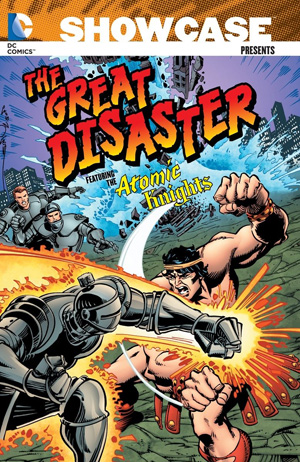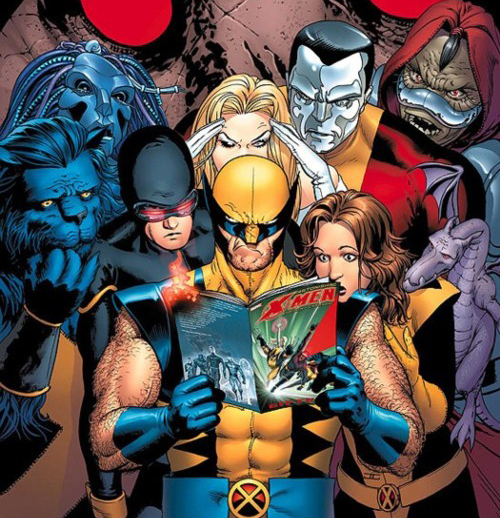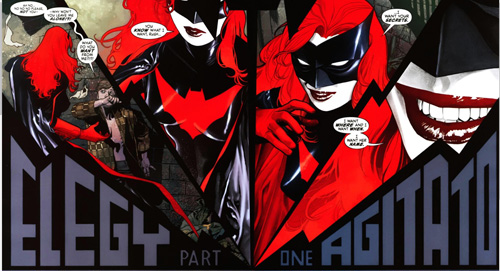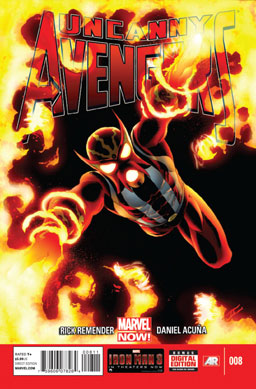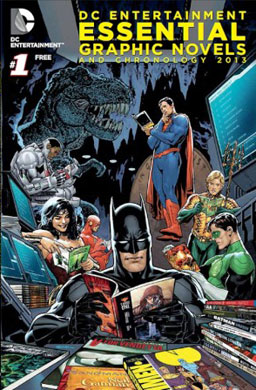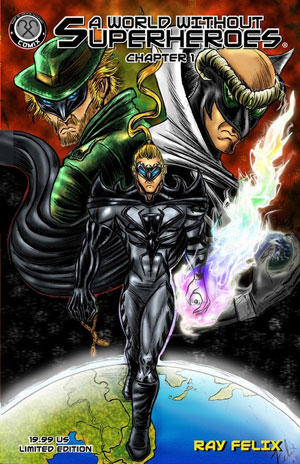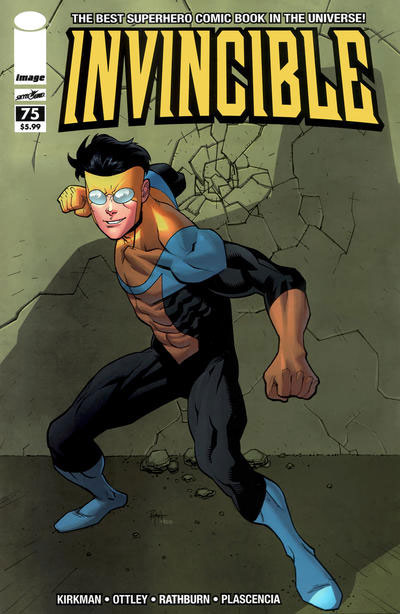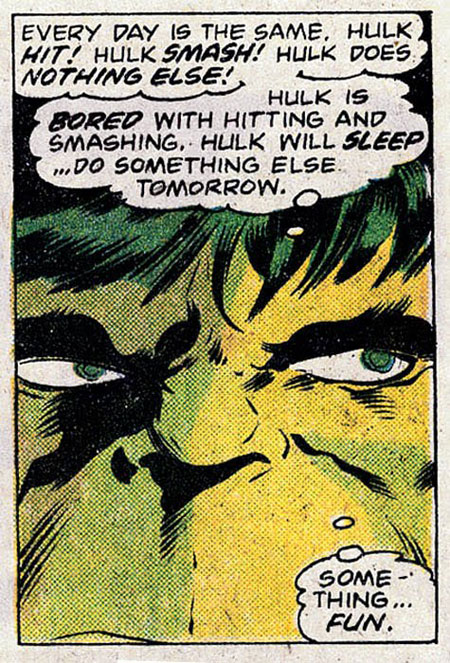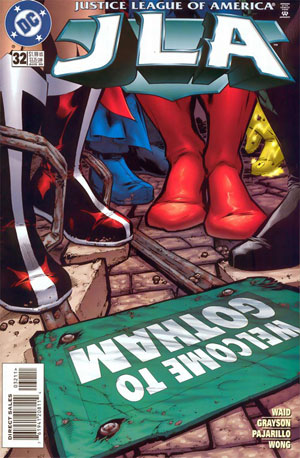
Y’all settle down and get comfortable. I’m gonna be talkin’ for a while.
Let’s start out with something that should be obvious to all of us: DC Comics is broken, and broken badly.
The New 52 has been, by and large, a disaster. The stuff that worked was either already working before the reboot or would’ve worked with or without it. The company makes poor decisions that seem to have no purpose other than gratifying the people running the company, and they seem to be working as hard as possible to alienate their readers. The marketing and public relations efforts are so laughable, they’ve inspired this wonderful site, which tries to track how long it’s been since the last DC PR disaster.
Which isn’t to say that Marvel doesn’t have its problems — an over-reliance on summer crossover events and a bizarre focus on giving Millar and Bendis way, way too many comics to write being chief among them — but they’re just not as screwed-up as DC is.
So what happens if the higher-ups at Warner Entertainment get a clue and put me in charge of their comics division? Let’s run down the list.
First, and most obviously, we’ll be firing the guys in charge of the company: Diane Nelson (if we’ll get hire-and-fire privileges over Warner execs), Dan DiDio, Geoff Johns, Jim Lee, and Bob Harras. And I can tell some folks are already saying “No, not Geoff Johns! Not Jim Lee!” Sorry, they’re both getting the axe. Johns is the Chief Creative Officer — and DC has been publishing a lot of deeply uncreative stories since the reboot. He is at least as responsible for the ongoing debacle as DiDio.
As for Lee — listen, I realize he draws real pretty, but he’s also the guy responsible for Superman’s new armored costume. And any costume that makes the long-maligned red-underwear costume look really, really good in comparison has got to be classified as a complete failure in costume design. Even worse is the costume redesign for the Flash. He took one of the most perfect superhero costumes in history and turned it into an over-busy disaster. That’s like deciding to improve the Taj Mahal by adding racing stripes and Ed Hardy logos. And it seems very likely that Lee is behind DC’s move to the ’90s-Image, flash-over-substance, let’s-make-everything-gritty-and-exxxtreme garbage. The guy hired Rob Liefeld, after all.
Ideally, not only would I fire these guys, but I’d try to blackball them as well. They’ve screwed DC up so hard, none of them really deserve to work in comics anymore. However, the comics business being the way it is, trying to keep these guys out, even for the good of the medium and the industry, would probably be an exercise in futility.
Second, dump the New 52. Let the writers finish their current storylines, then dump the Reboot completely. Need a way out of it? Try this: “Hey, Barry Allen, it’s me, Wally West! Flashpoint shot you into Earth-53, where everyone is unhappy and the costumes look like crap! Come on, I came over on the Time Treadmill to bring you back to Earth-1!” Or alternately, just leave Barry over there. I’m not a big fan of Barry Allen, and I wouldn’t care a smudge if we left him in a parallel universe.
With the Reboot out of the way, start rolling things back to the way they were before. Restore the classic looks for Superman, Wonder Woman, the Flash, Superboy, Supergirl, Nightwing, Beast Boy, Captain Marvel, and more. Restore the Robins to their proper places in the Bat-family. Leave Jason Todd — unfortunately, his resurrection has gotten too well-established by now, but he works best as an anti-hero or even a villain. Bring Damian Wayne back as the current Robin. Sorry, Grant Morrison — Damian is too good a character to discard, so he’s still alive on Earth-1.
What else? Huntress is going to be Helena Bertinelli again. I thought her story was a lot more interesting than Helena Wayne’s. Also, Batman isn’t going to have sleazy sex on rooftops with Catwoman, Starfire is not going to be an amnesiac slut, Roy Harper is going to have both arms.
Ya know who’s going to be making their triumphant returns? Pretty much everyone. Wally West, Cassandra Cain, Stephanie Brown, Renee Montoya (as the Question), Ryan Choi, Atlee, Lian Harper, Misfit, the entire Justice Society, the Secret Six, and Donna Troy will all exist again.
That doesn’t mean we’re completely abandoning characters created for the New 52. If we’ve got any characters we want to write stories about, we can have versions of them exist on Earth-1 as well — Batwing, Starling, Simon Baz, Bunker, Element Woman, Frankenstein, etc., etc. We own ’em — we’re not going to abandon them if they’re worth keeping.
And yes, we’re restoring DC’s classic continuity again. That’s one of the strengths of any long-lasting comic publisher — something Marvel definitely realizes. You dump your continuity, you dump your history — and comic fans really, really love continuity. We all know it’s true, and it’s time to accept that there are things we should be doing just because they make comics fans happy.
But we’re not necessarily going to restore the entire continuity. Frankly, this is a great opportunity to take some of the bad stories from the years just before the New 52 and throw them into the East River. Let’s get rid of “Cry for Justice” — Lian Harper is alive, Roy Harper isn’t an amputee, Green Arrow didn’t somehow get the drop on Prometheus, the Atom didn’t torture people by kicking their brains. Let’s get rid of “Identity Crisis,” too. There were parts of that story I kinda liked, but it’s worth it to memory-hole stuff like “Dr. Light raped Sue Dibny” and “Deathstroke moves faster than the Flash.”
Now here’s a tough question we’ll have to take care of: Is Barbara Gordon still Batgirl? Or is she wheelchair-bound Oracle again? That’s a damn good question, and trying to answer it is actually kinda scary. I think Barbara was a better character as Oracle, but you don’t want to take her out of the chair and then re-paralyze her again. It seems cruel. I think my preferred solution would give her both worlds — on Earth-1, she’s still paralyzed and does most of her good deeds, including leading the Birds of Prey, as Oracle. But in a world as full of technological miracles as the DCU, she should have access to a temporary treatment or super-suit that lets her periodically swing around Gotham as Batgirl.
However, for something as important as the fate of Barbara Gordon, I think I’d probably let some of the smart writers who love Babs, including Gail Simone and John Ostrander, take the lead in figuring out what happens to her.
Okay, that takes care of the New 52. But there are plenty of other items on our rebuilding agenda that we need to talk about.
What are we going to publish? No, I’m not going to talk about every single comic that’ll have the DC bullet on the cover, but let’s discuss some general trends. We should aim at publishing two Superman books, three starring Batman, and two for Green Lantern. There should also be a solo book for Damian Wayne. I’d love to see Power Girl back in her own comic again. And I think we should be publishing a comic called “Batgirls” that would star Barbara, Cassandra Cain, Stephanie Brown, and any other Batgirls we want to include — maybe the Huntress, maybe Carrie Kelly, maybe Harper Row.
I want “Dial H” moved under the Vertigo banner. It just doesn’t fit in a mainstream superhero universe, and we shouldn’t handicap it by trying to force it into that mold. I also want John Constantine out of the mainstream DCU and back in Vertigo. Heck, Vertigo needs to be strengthened in general — there’s more to comics than superheroes, and DC should embrace Vertigo’s vision. Can we get Karen Berger back in charge? Let’s try.
We’ll be giving the Wildstorm properties back to Jim Lee. There are actually some characters I think we could have some fun with, but we’ll be parting with Lee on less-than-friendly terms, and I think he’d be unlikely to let us keep using them.
I’d also like for DC to start publishing Milestone again, either as a separate imprint or more strongly blended into the mainstream DCU. DC and the comics world in general owe a debt to Dwayne McDuffie, and part of the way we could pay it back is to make sure his creations are still available to readers.
And one of the first things I’m going to do when I’m put in charge of the company? I’m greenlighting “Supergirl: Cosmic Adventures in the 9th Grade.” Because in complete seriousness, “Cosmic Adventures in the 8th Grade,” the 2009 all-ages series by Landry Q. Walker and Eric Jones, was phenomenally fun, and the creators had a great plan to continue the series all the way up to Supergirl’s senior year in high school.
I also want to give Art Baltazar and Franco permission to do anything they want to for our all-ages line. “Tiny Titans,” “Superman Family Adventures,” another series entirely — their work is just too much fun.
We need to be expanding our all-ages comics anyway. Not just comics based on TV shows, though those are important, too, but all kinds of comics for readers young and old. I don’t care if they’re not million-sellers. All-ages comics are how we get young readers and their parents caring about comic books. It’s how we persuade them to become lifelong comics fans. All-ages books are an investment in the future of the industry, and I think we need a lot of them.
And I want us to start cultivating more women and minority creators. It’s embarrassing that DC is so bad in that area. We need talent, and we don’t need to alienate anyone who has the skills to make good comics for us.
Also: Brian Clevinger and Scott Wegener, creators of “Atomic Robo”? We need them working on a book for us. Pronto.
And finally, let’s talk about the business side of things. And we’re going to start out scaring the crap out of the stockholders, ’cause a couple of our decisions will, in the short term, lose us some money.
I’d like to see us improve things financially for our freelancers. I’m the type of guy who’d kinda like to pay everyone a salary, but I also know that’s really not the way things work in the publishing world. Writers and artists in magazines, book publishing, and comics are, for the most part, freelancers who get paid when they do work for us. Not much of a way we’re going to be able to break that pattern, and ultimately, there’s probably no reason for us to try. But I’m tired of hearing about comic creators who die destitute or have to declare bankruptcy because of health troubles. We screw over too many of our creators while the corporation gets insanely rich on their work. So let’s try to improve things a bit. Better insurance options, better savings options, profit-sharing — anything we can do to keep creators’ heads above water. It’s not just good for our creators either — it’s good publicity for the company. And that is a gain for us in the long-term.
Ya know what else? It’s time to let Alan Moore have “Watchmen” back. He signed an agreement in good faith, and the company has gamed the system to keep from letting him have the rights back. I think it’s time to hand the rights back over. Now I’m sure the lawyers will have their say about which rights he’ll get — sorry, Alan, it’s really unlikely that you’ll be allowed to burn every copy of the movie. And here’s the other thing — after we give him the rights to “Watchmen” back, we say, “Listen, we know we haven’t had the best relationship, but that was with a different administration of the company. We want to let bygones be bygones. Now, would you like to write anything for Vertigo?” And that is also a gain for us in the long-term.
Anything else? I think it’s time to stop leaving marketing and PR in the hands of us hotheads in upper management. Comic readers and creators have strong opinions, and that often leads to us saying things that don’t go over well with the fans. It’s time to do what we can to reduce that, and that means hiring some real marketing and public relations professionals to make sure our messages — and our corporate messaging — are clear and efficient. And I think we need some of them helping guide us through pitfalls we’re not even aware of, so I want a public relations pro in a fairly high position to watch what we’re creating, who our creators are, who our readers are — and how to improve our communications and marketing, and to warn us when we’re about to do something that will needlessly alienate and anger our audiences. I don’t want them there to write corporation-safe stories for us — I want them to help us make sure great stories are getting told the right way.
And I’d like to improve the availability of all our collections, graphic novels, and trade paperbacks. I ran into a situation a couple weeks ago where I really wanted to get one particular trade paperback — a fairly recent one, too — but it was already out-of-print. That should never happen, barring short periods where we’re between print runs — everything we’ve published in book form should be available to readers, either in print or digital — or even in print-on-demand. We shouldn’t force readers to pay $50 for a trade paperback to complete their run on a series. We shouldn’t force them to torrent a series that isn’t available otherwise — because it’d be better for us to sell it to them ourselves! And I really think that, though it’ll cost some to make sure our comics — including the DC Showcase collections — are available, it’ll also be a long-term gain for us.
And finally, when it comes to our publishing philosophy, part of the work we’re doing needs to be comics evangelism. I’m not talking Stan Lee-style evangelism, because there’s only one Stan Lee, and I don’t think he’s gonna start publishing Stan’s Soapbox for us. What it does mean is that we need to work to spread the good news of comics everywhere. That means all-ages comics as an investment in the future of comics; alternative comics to make sure we’re not neglecting adult storytelling; female and minority heroes and creators because we need to expand our audience. And always great stories and great art and great characters. Because that’s still the best way to get more people reading and caring about comics.
And that, my children, is how we’re going to fix DC Comics.
